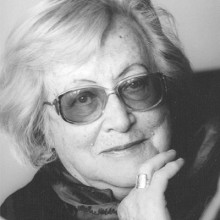Polish literature

Ida Fink
Born in 1921 in Zbaraz (currently in the Ukraine), Fink studied at the Lvov Conservatory. She spent the years 1941-1942 in a ghetto and survived after escaping to the "Aryan side". She has lived in Israel since 1957 where she has written exclusively about the Holocaust in Polish: the collection of stories A Scrap of Time (1987), The Journey (1990) and Traces (1996). She was honored with the Anne Frank Prize in 1985.
To be more precise, Ida Fink writes about how individual people survived - what resistance strategies they chose, what remained in their memories, how they tell their accounts. As the titles indicate, the stories are mere scraps and vestiges of the past. Only in this way – fragmentary and hardly epic, dry, sometimes tinged with a trace of irony or humor – is it possible to speak about the Holocaust. The short story form is imposed here not by aesthetics, but by the cruelty of the world. The theme of Ida Fink’s stories, which are collected together in The Ebbing Garden, is a remembrance of the Holocaust. Fink uses the terms ”former time” to mean before the Holocaust, and “latter time” to mean during the Holocaust. This distinction is fundamental, as Fink strives to capture an image of the world just before the Holocaust. With great precision, she describes something that is very rare in stories about the Holocaust – the physical beauty of the world. Descriptions of a fine morning, a misty orchard full of fruit, or a shady riverside are an attempt to capture the beauty of life. In contrast to traditional Shoah literature, Fink preserves colours, smells and flavours. Sourced from memories, her tales compose a sort of autobiographical fiction. The heroes of the stories are often eyewitnesses, people compiling evidence after the war, or interlocutors who reveal scraps of truth they pretended not to know about.
BIBLIOGRAPHY (SELECTED)
- Skrawek czasu, Londyn-Warszawa: Aneks, 1987.
- Podróż, Londyn-Warszawa: Aneks, 1990.
- Ślady, Warszawa: W.A.B., 1996.
- Odpływający ogród, Warszawa: W.A.B., 2003.
- Podróż, Warszawa: W.A.B., 2004.
- Wiosna 1941, Warszawa: W.A.B., 2009.
TRANSLATIONS
Czech:
- Jaro 1941 [Skrawek czasu, Notatki do życiorysów, Odpływający ogród], trans. Lenka Daňhelová, Brno: Barrister&Principal, 2012.
Danish:
- Rejsen [Podróż], Kopenhaga: Vindrosl, 1993.
Dutch:
- De reis [Podróż], Amsterdam: Menlenhoff, 1991.
- De wederopstanding van de bakker [Ślady], Amsterdam: Menlenhoff,1997.
- Een kleine Ogenblik [Skrawek czasu], Haga: BZZTOH, 1984.
English:
- The Journey [Podróż], New York: Farrar-Straus, 1992.
- A Scrap of Time [Skrawek Czasu], New York: Pantheon, 1987.
- Traces [Ślady], New York: Metropolitan Books, 1997.
French:
- Le Jardin a la dérive [Skrawek czasu], Paris: Maren Sell, 1989.
- Le Voyage [Podróż], Paris: Editions Robert Laffont, 1992.
- Traces [Ślady], Paris: Calmann-Lèvy, 2000.
German:
- Die Reise [Podróż], München: Piper, 1991.
- Eine Spanne Zeit. Erzählungen und das Stück: Der Tisch [Skrawek czasu], Frankfurt am Main: Fischer Taschenbuch Verlag, 1986.
- Notizen zu Lebensläufen [Slady], Frankfurt a.M.: Fischer, 1998.
Hebrew:
- Nelech b'lejon niskan b'jamim [Podróż], Tel Aviv: Sifriet Poalim, 1993.
- Hagan ke-meflik l'marchakim [Skrawek czasu], Tel Aviv: Sifriet Poalim, 1988.
- Rishumim l'karot chaim [Ślady], Tel Aviv: Am Oved, 1996.
Hungarian:
- Elúszó kert [Odpływający ogród], Budapest: Múlt és Jövő, 2005.
Italian:
- Il vieggi [Podróż], Parma: Guanda, 1993.
- Frammenti di tempo [Skrawek czasu], Milano: Feltrinelli, 1995.
- Tracce : racconti intorno alla Shoà [Ślady], Firenze: Giuntina, 2003.
Norwegian:
- Reisen [Podróż], Oslo: Document Forlag, 1997.
Portugese:
- A viagem [Podróż], Rio de Janeiro: Imago, 1998.
Spanish:
- El viaje [Podróż], Madrid: A.Mondadori, 1991.
- Huellas [Ślady], transl. Elżbieta Bortkiewicz, Errata Naturae, 2012.
Swedish:
- Resan [Podróż], Stockholm: Bokförl.Tranan, 2003.